It's time for Blizzard to change World of Warcraft's expansion formula
And bring old expansions back into the fold.
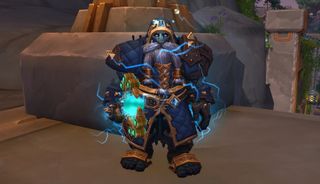
Since 2020's World of Warcraft: Shadowlands, the venerable MMO has been following a very specific expansion release formula—four new zones, three raids, eight dungeons, a couple of new features such as delves, and four seasons to keep you busy after you’re done with reputation grind and the campaign.
Even though Blizzard did expand and improve this formula in Dragonflight by adding smaller patches like 10.0.5 and 10.0.7 focused on class balancing and new events, the structure has remained intact across the last three expansions, and much of that structure was also inherited from the expansions that came before. WoW's changed a lot over the last 20 years, and it's time to change again—to shake up the good old formula and breathe in a new life into the expansion cycle.
Credit where credit's due
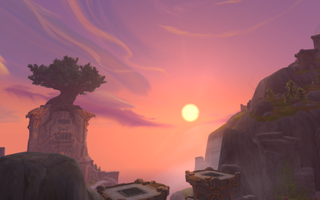
It's clear that Blizzard has drastically improved the modern-day WoW since the disaster that was Shadowlands, with its time-gating, lack of alt-friendly features, borrowed power in the form of covenants and legendaries, poor storytelling, and most importantly, content drought.
In Dragonflight, Blizzard took all the feedback it got from players, and used it as a means to improve the game. That meant regular class balancing updates, more alt-friendly features, and frequent patches which always introduced a new event for catch-up gear, as well as fun diversions like the Dawn of the Infinite mega-dungeon.
The War Within takes these improvements and runs with them, notably in areas like world quests, the Great Vault rewards, and account-wide progression (the Warbands system) that makes spending time with your alts a delight rather than a hassle. But this doesn't mean Blizzard should rest on its laurels.
New features invalidate the old ones
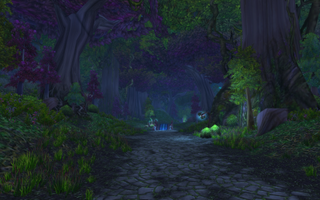
Blizzard has a habit that's unique to WoW—releasing new features that automatically invalidate old ones. For example, with the release of The War Within, the Dragon Isles and the months and months of development that went into it are no longer relevant, including raids, dungeons, reputations, and, of course, gear. No other MMO does this.
Final Fantasy 14 and Old School RuneScape, for instance, found a way to preserve stuff from previous updates and prevent it from becoming irrelevant.
The biggest gaming news, reviews and hardware deals
Keep up to date with the most important stories and the best deals, as picked by the PC Gamer team.
The most common tool Old School RuneScape devs use is upgrading the old gear. So, instead of simply getting a new ring, you'd need to upgrade the old one. On top of that, some items have niche uses and precisely because of that, they will always be an important piece of gear.
The perk of Final Fantasy 14 is that it doesn't remove the old features (unlike WoW), meaning you can always go back. The game also leads you to past zones for quests or gear, and players enjoy the expanded story in alliance and normal raids.
Right now, there are 20 years worth of WoW worth raids, dungeons and locations, most of them revisited solely because of achievement, mount, transmog, and pet farms. Unfortunately, this also applies to raids in the same expansion. Nerub-ar Palace is the most recent raid in The War Within, and as soon as a new large update drops, finding a group to clear it will be increasingly harder as the expansion goes on simply because not many players will be clearing it.
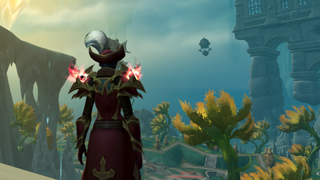
The main reason why players go back to previous zones and raids is to get transmogs and achievements. The new raid will offer better gear and it will be a challenge to clear it, as it's balanced around your new gear.
Although Timewalking can give you a glimpse of how one of the previous expansions looked and felt, these are limited, albeit recurring, events. Mist of Pandaria: Remix, meanwhile, was a step in the right direction, but it was a limited-time mode and separate from retail World of Warcraft, and now it's gone.
Blizzard could go about this in a number of different ways, but what I'd love to see are large-scale Mists of Pandaria: Remix-like events in retail World of Warcraft which last for a month or two. Items, dungeons, and raids should be scaled for current item levels, and players can choose whether they want to complete the new or the old stuff.
On top of that, Blizzard could make materials from previous expansions essential for crafting new items, add new events and world quests to old zones (like in Season of Discovery) which grant new rewards and currencies, realm-wide quests that require large-scale contributions (akin to the opening of Ahn'Qiraj gates).
Leveling is no longer the journey it used to be
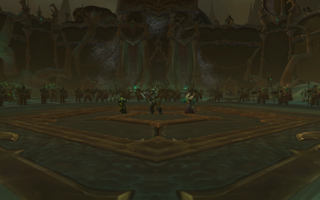
One of the most glaring differences when you compare The War Within to its classic counterpart (specifically vanilla WoW, rather than Cataclysm Classic) is leveling. World of Warcraft: Classic is all about the journey and the friends you made along the way, and it has a strong sense of community because of that. In contrast, retail leveling is simply a means to get to the max level.
I have yet to meet a player who enjoys leveling in modern-day World of Warcraft since it feels too grindy, the gear upgrades are meaningless and you will replace them with your best-in-slot as soon as you reach the endgame. The entire process feels redundant, as all you want to do is reach your destination: max level.
Leveling should be equally or even more important than the endgame, though. Players are always leveling new characters, either as their alts or mains. It's something we all do, multiple times, so it should be as engaging as the high-level activities. Although the process is made simple through power-leveling with heirlooms, dungeons, Chromie time, and even boosts, it's a real shame such an important aspect of the game hasn't been revisited properly for four years now.
Even Blizzard itself is, to an extent, acknowledging that leveling is not an enjoyable experience by continuously offering you raid-ready boosts. Former World of Warcraft (and the League of Legends MMO) developer Greg 'Ghostcrawler' Street believes that reaching max level should be an accomplishment, and "not a blip," and it's hard not to agree. With power-leveling, there's no time to learn and deeply understand your class, have memorable encounters you'll retell your friends, or even explore the expansion.
Leveling would benefit from a major overhaul with reduced experience gains, better leveling gear options, additional rewards for questing, and the removal of sharding entirely. The world feels all too empty, and being alone on an entire continent is not exciting. If players knew there were hundreds, if not thousands, of others leveling in the same expansion, they'd be more inclined to go out in the open world and join forces.
Am I a hamster?
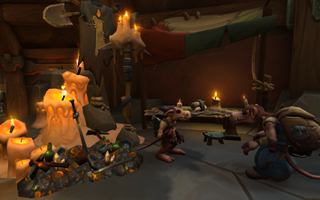
If you look beyond the excitement of timed dungeons and the sweat and tears that go into semi-hardcore and hardcore raiding, the endgame boils down to a hamster wheel of chasing gear of higher item levels.
It's true that higher difficulties, such as Heroic raids and high-end Mythic+ keys, require you to 'git gud' and understand the limits of your class, but as soon as you master those, the only other limitations are the number of raids and the dungeons you've completed and your item level that is slowly (and I mean slooooowly) moving up. So you're stuck in a loop of doing dungeons for the sake of improving the item level of your gear so that you can do the same dungeons and raids but at a higher difficulty.
Dungeons, raids, and PvP are the true endgame focus, while world quests and reputation farming seem like nothing more but chores you have to complete because you're either on the hunt for your next achievement or you need more currency to upgrade your item level.
The endgame lacks depth, and Blizzard could improve it by adding meaningful rewards behind world quests, adding more unique recipes in the open world, organizing realm-wide events and efforts, bringing back attunements, and including more features that have direct consequences on your character. WoW focused too much on item level and difficulty that it forgot the RPG element in MMORPG.
Do we really need this many currencies?
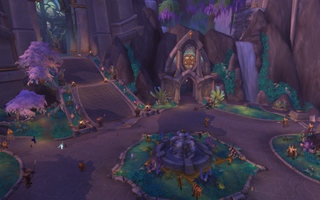
WoW players have time and time again complained about the number of currencies, and all that Blizzard has done is move them into our currency tab (at least some of them). Right now, I have seven different currencies on my main (not counting Coffer Key Shards and other in-bag currencies).
Not only does this make it hard to identify the source of these currencies, but this way you're forcing players to complete activities they actually don't want to do. For example, all Renown Quartermasters sell you their gear and toys for Resonance Crystals, but Severed Threads Quartermasters ask for Kej. Besides that, why are there four currencies for upgrading gear, and not only one or two?
Instead, Blizzard should trim down the number of currencies and divide them into three categories—PvE, cosmetics and mounts, and PvP. It wouldn't be overwhelming to have two to three currencies for each category. Also, this should apply retroactively and all past currencies should be replaced with the new ones.
World of Warcraft, moving forward
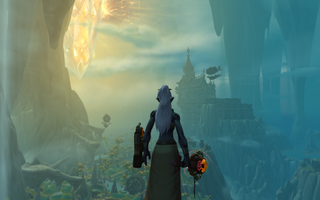
For years now, WoW has been stuck in the same cycle—creating new features and raids, abandoning them, and then creating some more new stuff that will fill in the same hole. Ner'ubar Palace replaced Awakened Raids, and a couple of months later, it too will be replaced with another one. The system lacks a clear-cut way to make all these months and years of developed features evergreen.
While the system of churning out another eight dungeons, raids, and zones every expansion works for retail WoW, Blizzard should also focus on diving back into its legacy and reinvigorating all the stuff that's already in the game but just collecting dust. Each new expansion should include new features, but it should also take another look at systems such as stale endgame activities, leveling, and currencies.
The community is aching for updates of the old world and systems, and many fans would gladly revisit old expansions, as was the case with Mists of Pandaria: Remix. Revamping old and outdated systems and zones would give players more than enough reason to go back to beloved expansions, especially if they haven't experienced the expansion.
Designing such a system where Legion and Mists of Pandaria could live in symbiosis and are equally important, where leveling is the journey it used to be, and the endgame is more exciting than an infinite loop would open up WoW in unimaginable ways and bring the game back to its former glory.
Most Popular

